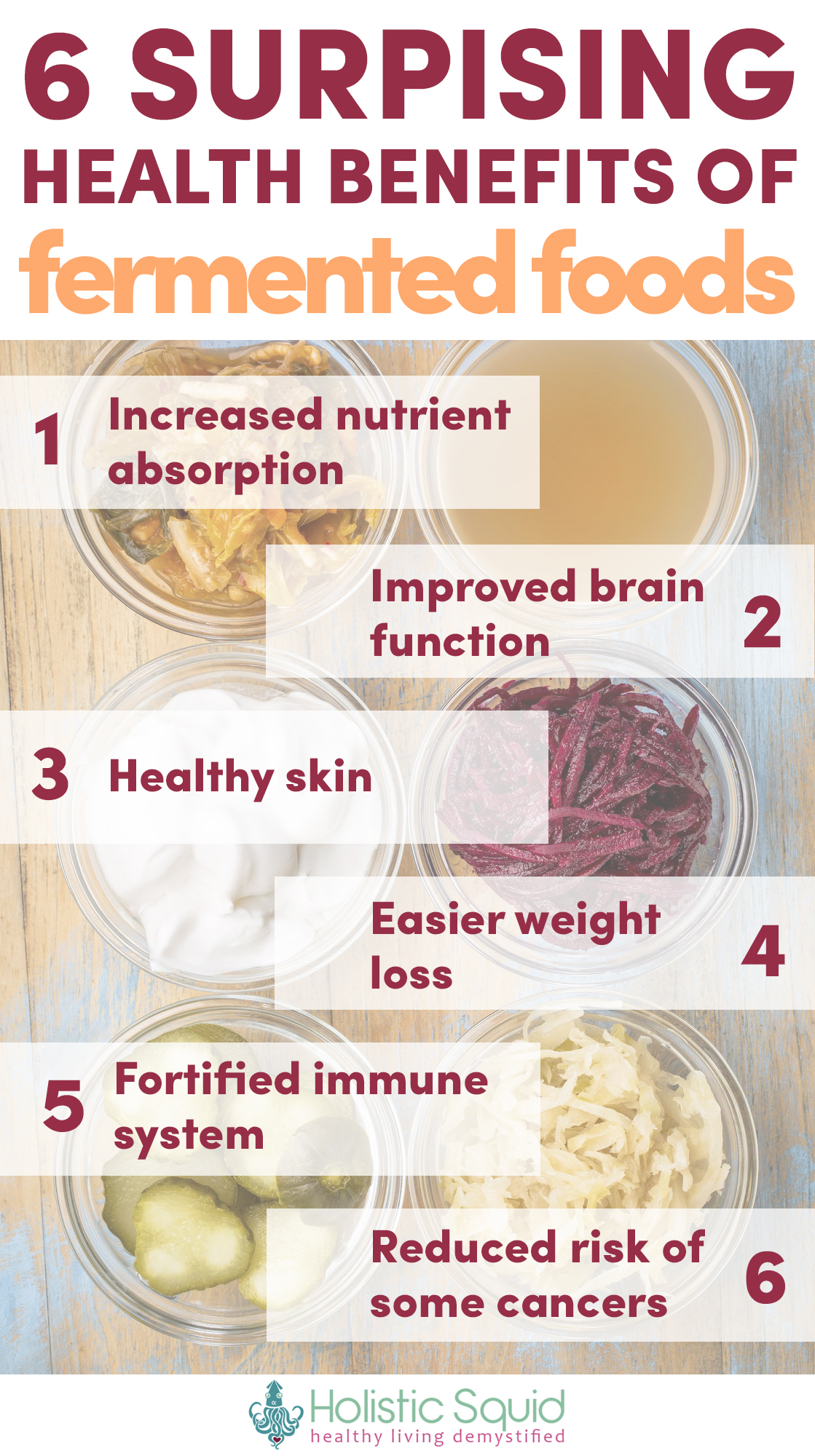Benefits of Fermented Foods have been a part of human culinary traditions for thousands of years. They are created through a natural process of fermentation, where microorganisms like bacteria or yeast break down the carbohydrates in food and convert them into acids or alcohol. This process not only gives fermented foods their distinct flavors and textures but also enhances their nutritional value. From sauerkraut and kimchi to yogurt and kefir, fermented foods offer a wide range of health benefits, including improved digestion, boosted immune system, and better metabolic health. So, let’s delve into the world of fermented foods and explore their incredible health benefits.
What are Fermented Foods?

Fermented foods are foods that have undergone the process of fermentation, where microorganisms such as bacteria or yeast break down the carbohydrates in the food. This process of fermentation not only changes the flavors and textures of the food but also enhances its nutritional value. Common examples of fermented foods include sauerkraut, kimchi, yogurt, kefir, and tempeh. These foods not only provide a tangy and flavorful addition to meals but also offer numerous health benefits. Incorporating fermented foods into your diet can help improve digestion, boost the immune system, and promote overall health and well-being.
History and importance of Fermented Foods
Fermentation has a long history, dating back thousands of years. It was initially used as a means of preserving food before refrigeration. In ancient times, civilizations like the Romans, Greeks, and Chinese utilized fermentation to create foods with enhanced flavors and extended shelf life. Today, fermented foods continue to play a crucial role in various cultures and cuisines worldwide. They are valued for their unique tastes, textures, and nutritional benefits. Fermented foods are not only delicious but also offer probiotics, enzymes, vitamins, and minerals that promote overall health and well-being. Including fermented foods in your diet can be an easy and enjoyable way to improve your health.
Improved Digestion and Gut Health

Fermented foods are known to improve digestion and promote gut health. The process of fermentation breaks down the complex carbohydrates and proteins in food, making them easier for the body to digest. Additionally, fermented foods contain beneficial bacteria, known as probiotics, that help maintain a healthy balance of gut microbiota. These probiotics aid in the breakdown and absorption of nutrients, and also support the production of enzymes that further enhance digestion. By including fermented foods in your diet, you can support a healthy digestive system and improve your overall gut health.
How Fermented Foods enhance digestion
Fermented foods have the incredible ability to enhance digestion in several ways. The fermentation process breaks down complex carbohydrates and proteins into simpler forms, which makes them easier for your body to digest. This means that your gut doesn’t have to work as hard to break down these foods, leading to improved digestion. Additionally, fermented foods contain enzymes and probiotics that aid in the digestion and absorption of nutrients. These beneficial bacteria help maintain a healthy balance of gut microbiota, further supporting digestion. By incorporating fermented foods into your diet, you can promote a healthy and efficient digestive system.
Impact of Fermented Foods on gut microbiome

Fermented foods have a profound impact on the health of your gut microbiome. The beneficial bacteria present in fermented foods help to restore and maintain a healthy balance of microorganisms in your gut. This is crucial for optimal digestion, nutrient absorption, and overall gut health. The probiotics in fermented foods also help to strengthen the intestinal barrier, preventing harmful bacteria from entering your bloodstream. By including fermented foods in your diet, you can promote a flourishing and diverse gut microbiome, which is essential for good health and immune function.
Boosted Immune System

Fermented foods can play a vital role in boosting your immune system. The probiotics present in fermented foods help to balance the gut microbiome, which plays a significant role in immune function. A healthy gut microbiome strengthens your immune response, making you less susceptible to infections and diseases. Fermented foods also contain key nutrients like vitamins C, D, and zinc, which are essential for a robust immune system. Incorporating fermented foods into your diet can help support your immune system and keep you feeling healthy and strong. So, don’t forget to include foods like yogurt, sauerkraut, and kimchi in your meals to give your immune system a well-deserved boost.
Fermented Foods and immune system support
Fermented Foods are a powerful ally when it comes to supporting and boosting your immune system. The probiotics found in fermented foods help to balance the gut microbiome, which is crucial for a strong immune response. These probiotics stimulate the production of immune cells and promote their activity, making you less susceptible to infections and diseases. Incorporating fermented foods like yogurt, kefir, and sauerkraut into your diet can strengthen your immune system and keep you feeling healthy and resilient. So, don’t underestimate the immune-boosting benefits of these delicious and nutritious foods.
Key nutrients in Fermented Foods for immunity

Fermented foods are rich in key nutrients that can boost your immunity. One of the main nutrients found in these foods is probiotics, which are beneficial bacteria that support a healthy gut environment. Probiotics help stimulate the production of immune cells, improving their function and ability to fight off pathogens. Additionally, fermented foods contain vitamins and minerals, such as vitamin C and zinc, which are essential for a strong immune system. By incorporating fermented foods like yogurt and sauerkraut into your diet, you can provide your body with these vital nutrients and enhance your immune response. So, don’t forget to add these immune-boosting foods to your meal plan.
Nutritional Value of Fermented Foods
Fermented foods have high nutritional value, packed with essential nutrients that are beneficial for your overall health. One of the key nutrients found in fermented foods is probiotics, which promote a healthy gut flora. These foods also contain vitamins and minerals, such as vitamin C and zinc, which boost your immune system. Additionally, fermented foods are a good source of fiber and antioxidants, which support digestion and reduce inflammation. By incorporating fermented foods like yogurt, kimchi, and kefir into your diet, you can enjoy the numerous health benefits they offer.
Probiotics and other nutrients in Fermented Foods

Fermented foods are a rich source of probiotics, which are beneficial bacteria that promote a healthy gut flora. These probiotics help improve digestion, reduce bloating, and enhance nutrient absorption. In addition to probiotics, fermented foods contain other essential nutrients such as vitamins, minerals, and antioxidants. For example, yogurt is high in calcium, kefir is packed with vitamins K and B12, and kimchi is rich in vitamins A and C. Incorporating a variety of fermented foods into your diet can provide you with a diverse range of nutrients that support your overall health and well-being.
Comparing the nutritional value of different Fermented Foods

When it comes to the nutritional value of fermented foods, there are some key differences to consider. Let’s compare a few popular options. Yogurt, for example, is high in calcium and protein, making it a great choice for bone health and muscle repair. Sauerkraut, on the other hand, is low in calories and packed with vitamin C, making it a good option for immune support. Kimchi is rich in vitamins A and C, and kombucha is a good source of B vitamins and antioxidants. Incorporating a variety of fermented foods into your diet ensures you receive a diverse range of nutrients to support your overall health.
Weight Management and Metabolic Health

Fermented foods can be beneficial for weight management and metabolic health. Incorporating them into your diet can support weight loss by promoting feelings of fullness and reducing cravings. Fermented foods may also improve insulin sensitivity, which can help regulate blood sugar levels and prevent spikes in glucose. Additionally, fermented foods have been shown to enhance metabolic health by reducing inflammation and improving the balance of gut bacteria. By including fermented foods in your diet, you can support your weight management goals and promote overall metabolic well-being.
Fermented Foods and weight loss

Incorporating fermented foods into your diet can be beneficial for weight loss. These foods, such as sauerkraut, kimchi, and kefir, are low in calories but rich in nutrients and beneficial bacteria. The probiotics found in fermented foods can enhance digestion and improve gut health, which can support weight management. Additionally, fermented foods can promote feelings of fullness and reduce cravings, making it easier to stick to a calorie-controlled diet. By adding fermented foods to your meals, you can support your weight loss goals and enjoy their numerous health benefits.
Fermented Foods impact on metabolic health
Including fermented foods in your diet can have a positive impact on your metabolic health. These foods contain beneficial bacteria that can help improve digestion and nutrient absorption, which are essential for maintaining a healthy metabolism. Fermented foods also promote the production of short-chain fatty acids, which can support a healthy weight and regulate blood sugar levels. Additionally, fermented foods can help reduce inflammation in the body, which is linked to metabolic disorders such as obesity and diabetes. By incorporating fermented foods into your meals, you can support your metabolic health and enjoy their numerous benefits.
Conclusion of Benefits of Fermented Foods
Incorporating fermented foods into your diet can have numerous health benefits. From improving digestion and gut health to boosting the immune system and supporting weight management, fermented foods offer a variety of advantages for your overall well-being. By including foods like yogurt, kimchi, sauerkraut, and kefir in your meals, you can introduce beneficial bacteria to your gut, enhance nutrient absorption, and even promote a healthy weight. Remember to start slowly and listen to your body’s response when incorporating fermented foods into your daily routine. Enjoy the delicious flavors and reap the rewards of these nutrient-rich, gut-friendly foods.
Tips for including Fermented Foods in your daily meals

To start incorporating fermented foods into your daily meals, here are some helpful tips:
- Start small: Begin by introducing small amounts of fermented foods into your diet and gradually increase the quantity as your body adjusts.
- Choose a variety: Explore different types of fermented foods like yogurt, sauerkraut, kefir, and kimchi to diversify your nutrient intake and maintain interest in your meals.
- Pair with other dishes: Use fermented foods as toppings or side dishes to add a tangy and savory flavor to your meals. They can complement salads, sandwiches, wraps, and even stir-fries.
- DIY fermentation: Try making your own fermented foods at home using starter cultures or starter kits. This allows you to control the ingredients and experiment with different flavors.
- Be mindful of texture: Fermented foods can vary in texture, from creamy yogurts to crunchy pickles. Consider the texture you prefer and incorporate it into your meals accordingly.
Remember, it’s important to listen to your body and choose fermented foods that you enjoy. These simple tips can help you incorporate these beneficial foods into your daily routine.
Potential risks and precautions when consuming Fermented Foods

When consuming fermented foods, it is important to be aware of potential risks and take necessary precautions.
- Allergies: Some fermented foods may contain allergens like soy, dairy, or gluten. If you have any known food allergies, read labels carefully and avoid fermented foods that contain those allergens.
- Salt content: Fermented foods like pickles and sauerkraut can be high in sodium. If you are watching your sodium intake, consider consuming these foods in moderation or opting for low-sodium alternatives.
- Food safety: Improper fermentation can result in the growth of harmful bacteria. Ensure that fermented foods are prepared hygienically and stored properly to prevent foodborne illnesses.
- Intolerance: Some individuals may experience digestive issues or intolerances to certain fermented foods. If you have any underlying health conditions or concerns, consult with a healthcare professional before incorporating fermented foods into your diet.
Remember, moderation and balance are key when incorporating fermented foods into your daily meals. Listen to your body and make choices that align with your specific needs and preferences.
For More Blogs visit Aerns

